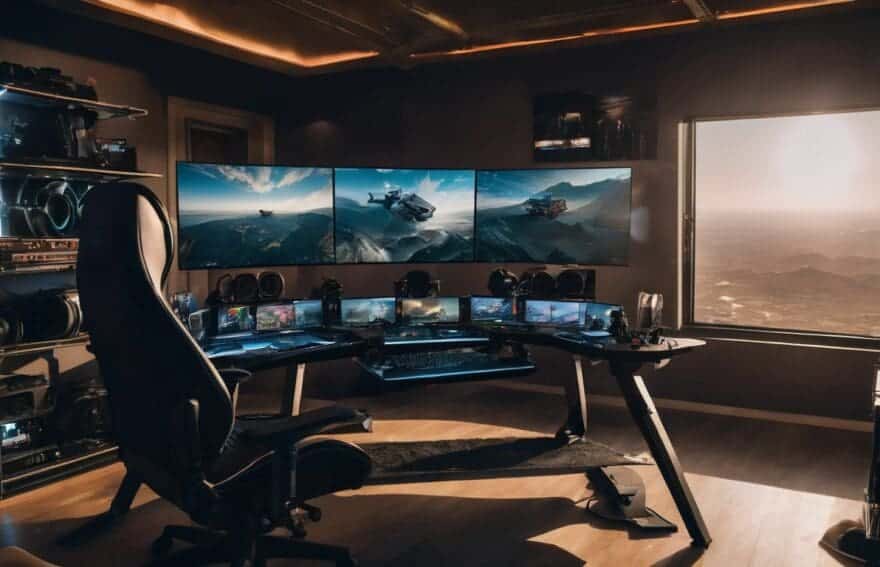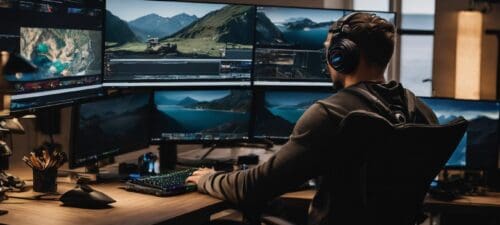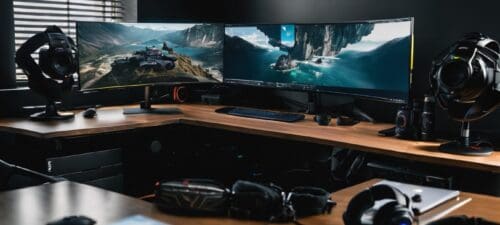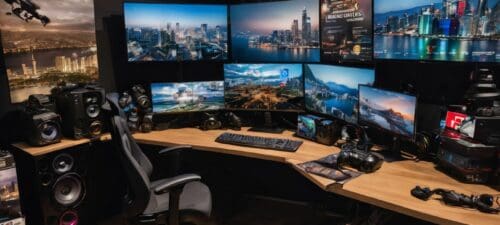The Path to Pro: How to Start a Career in Esports

Updated On: February 28, 2024 by Aaron Connolly
Embarking on a career in esports can often feel like navigating uncharted waters, with many of us wondering where to even begin. We’ve all experienced those initial pangs of uncertainty, diving headfirst into the electrifying domain of competitive gaming—a realm that now boasts an estimated global revenue well over the £1 billion mark.
Our own odyssey through the ranks has armed us with valuable insights. These hard-earned pearls of wisdom are what we’re eager to share with you, enabling your transformation from an enthusiastic novice to a seasoned professional contender.
Let’s together unveil your unique path to pro; it’s time we charted out this strategy hand-in-hand, ready for you to conquer the world stage by storm.
Key Takeaways
- To launch a career in esports, select a game that fits your interests and invest time in improving your skills and strategy through consistent practice.
- Building connections is vital; join gaming communities, network at events, and consider streaming to grow an audience and attract sponsorships.
- Consider joining a team to enhance skills through collaboration and enter tournaments to gain competitive experience.
- Balance intense gaming sessions with self-care practices like exercising, maintaining social interactions, and ensuring adequate rest for mental and physical well-being.
- Quality equipment contributes significantly to performance; ensure you have the right gear for optimal gameplay.
Understanding Professional Gaming
Professional gaming, also known as eSports, is the competitive world of video gaming where individuals or teams compete for cash prizes and recognition. It requires not only exceptional gaming skills but also a deep understanding of strategy, teamwork, and determination to succeed in this rapidly evolving industry.
Definition of professional gaming
Professional gaming, also known as esports, transforms playing video games from a hobby into a legitimate career path. We see it as competitive video gaming at its highest level, where skilled players or teams compete in organised tournaments and leagues for prize money and titles.
These gamers are not casual enthusiasts; they’re experts striving to dominate their selected games just like athletes do in traditional sports.
To carve out a successful career in this rapidly growing industry, one must have more than just talent in playing video games. It’s about honing craft through consistent practice, investing time to understand the strategic depth of your chosen game, and cultivating the quick reflexes required to outperform competitors.
Just like any sportsperson needs premium gear for peak performance, pro gamers rely on top-notch gaming equipment ensuring no delay between thought and action. Embracing professional gaming means making it much more than a pastime – it’s embracing both passion and profession with equal fervour.
Success and profitability
Transitioning from understanding the definition of professional gaming, let’s delve into the world of success and profitability in esports. As you progress on your path to becoming a pro gamer, it’s important to understand that success in this industry can significantly impact your financial stability.
Top players have earned substantial salaries and lucrative sponsorship deals, allowing them to turn their passion for gaming into a sustainable career.
Professional gamers often enjoy attractive financial rewards through tournament winnings, streaming revenue, endorsement deals with gaming companies, and other forms of brand partnerships.
Skills and Traits of Professional Gamers
Professional gamers possess a unique set of skills and traits that set them apart from recreational players. Their dedication, strategic thinking, and quick reflexes are essential for success in the competitive gaming industry.
Dedication and discipline
Dedication and discipline are crucial traits for anyone aiming to become a professional gamer. It takes time and effort to hone your skills and rise through the ranks of the gaming community.
Setting aside ample time for focused practice sessions will help you build expertise and improve your abilities. Professional gaming demands commitment, patience, and a strong work ethic.
To succeed in the competitive world of esports, you must be disciplined in managing your time effectively. Balancing gameplay with other aspects of life requires careful planning and dedication.
Strategic thinking
Strategic thinking is crucial for professional gaming success. It involves planning your moves carefully, anticipating your opponent’s actions, and making quick decisions to gain an advantage.
Understanding the game mechanics and developing unique strategies can give you the upper hand in competitive gaming. By analysing different scenarios and adapting to changing game conditions, strategic thinkers are able to outmanoeuvre their opponents and secure victory.
Developing this skill takes time and practice but can greatly enhance your performance in esports tournaments.
To excel in professional gaming, strategic thinking should be combined with dedication and quick reflexes. This combination of skills will enable you to navigate complex game situations effectively while staying ahead of the competition.
Quick reflexes and hand-eye coordination
To succeed in professional gaming, quick reflexes and hand-eye coordination are essential skills. These abilities allow gamers to react swiftly to in-game situations and navigate fast-paced environments with precision and accuracy.
Competitive gaming demands split-second decision-making, requiring players to process visual information rapidly and execute precise movements without hesitation. Developing these skills through consistent practice is crucial for aspiring pro gamers.
Gamers can hone their reflexes and hand-eye coordination by embracing challenging scenarios within their chosen game. By immersing themselves in intense gameplay sessions, they can train their minds and bodies to respond quickly while maintaining accuracy.
Furthermore, engaging in regular exercises designed to enhance reaction times can significantly benefit a gamer’s performance in high-stakes competitive settings.
Steps to Becoming a Pro Gamer
To become a pro gamer, you need to choose your game and platform, practice consistently, join a gaming community, invest in quality equipment, attend local events, join a team, and compete in leagues and tournaments.
This will help you build the skills and connections needed to kickstart your career in esports.
Choose your game and platform
Research and explore different gaming genres to find the one that suits your interests and strengths. Consider popular titles in competitive scenes such as first-person shooters, multiplayer online battle arenas (MOBAs), or real-time strategy games.
Take into account the platform you enjoy playing on – whether it’s console, PC, or mobile. Reflect on your skills and preferred playstyle to make an informed choice about the game and platform that best fit your aspirations of becoming a professional gamer.
Once you’ve identified your game of choice, delve into its community and immerse yourself in the intricacies of gameplay mechanics and strategies. Familiarise yourself with the competitive scene surrounding your selected game to gain insight into professional gaming opportunities within that realm.
Practice consistently
After choosing your game and platform, it’s crucial to practice consistently to improve your gaming skills. Set aside dedicated time each day or week for focused practice sessions.
Consistency is key in honing your reflexes, strategic thinking, and overall performance. Start with small goals and gradually increase the intensity of your training as you progress.
In the esports industry, regular practice not only sharpens your gameplay but also demonstrates your commitment and work ethic to potential sponsors or team recruiters.
Join a gaming community
Entering the world of professional gaming requires more than just individual skill. Connecting with a gaming community can provide you with valuable support, resources, and networking opportunities.
In these communities, you can get advice from seasoned gamers, learn about upcoming tournaments or events, and even find potential teammates to join forces in competitive play. Surrounding yourself with like-minded individuals who share your passion for gaming can offer both guidance and motivation as you pursue your dream of becoming a pro gamer.
As we explore how to start a career in esports, joining a gaming community is an essential step that helps cultivate relationships and opens doors to various opportunities within the industry.
Invest in quality equipment
Investing in quality equipment is crucial for honing your gaming skills and staying competitive. High-performance gaming peripherals like keyboards, mice, and headsets can significantly impact your gameplay.
Ensuring that you have a powerful computer or gaming console with high-quality graphics capabilities will provide you with the smoothest gaming experience possible. Having a reliable internet connection is also essential to reduce lags and latency during online matches.
Gamers aiming for professionalism should prioritise ergonomic design of their equipment to prevent discomfort during long hours of practice. Additionally, selecting a comfortable chair that supports good posture can help maintain focus during extended gameplay sessions.
Attend local events
After investing in quality equipment, it’s time to step out and immerse yourself in the gaming community by attending local events. Networking is crucial in the esports industry, and these events provide opportunities to meet other gamers, potential teammates, sponsors, and even industry professionals.
By participating in these gatherings, you can gain valuable insight into upcoming tournaments and leagues while building connections that could open doors for your budding gaming career.
Local events also offer a platform for honing your skills in a live setting. You’ll have the chance to compete against fellow gamers, putting your abilities to the test and gaining experience that will prove invaluable as you progress on your path to becoming a professional gamer.
Join a team
After attending local events and networking with other gamers, the next step is to join a team. Being part of a gaming team can provide valuable opportunities for growth and improvement in your skills.
Look for teams that align with your game of choice and share similar goals and values. Collaborating with like-minded individuals will not only enhance your gameplay but also provide support and camaraderie as you navigate the competitive gaming landscape.
Keep in mind that joining a team may require dedication, teamwork, and effective communication – essential skills in the professional gaming industry.
Compete in leagues and tournaments
To establish yourself in the competitive gaming scene, it’s essential to actively participate in leagues and tournaments. These events provide an incredible platform for showcasing your gaming expertise and networking with industry professionals.
By competing in various leagues and tournaments, you not only hone your skills but also gain exposure to potential opportunities within the esports industry. It’s a chance to prove your competitive gaming skills while familiarising yourself with the high-stakes atmosphere of professional gaming.
Engaging with like-minded individuals at these events can introduce you to valuable connections that could potentially pave the way for future career prospects. Competing in leagues and tournaments allows you to continuously challenge yourself, refine your strategies, and demonstrate your ability to perform under pressure.
Moreover, success in these settings can lead to recognition from esports companies or even attract sponsorships that may further support your journey towards a professional gaming career.
The Role of Streaming in Professional Gaming
Streaming in professional gaming offers a platform to showcase your skills, build a fan base, and attract sponsorship opportunities. It also provides networking opportunities within the gaming community.
Benefits of streaming
Streaming your gaming sessions can offer various benefits to aspiring pro gamers. Building a strong online presence through live streaming provides opportunities for networking and connecting with potential fans and sponsors.
By engaging with your audience in real-time, you can cultivate a loyal fan base and attract sponsorship opportunities, which are crucial for advancing your career in esports. Furthermore, streaming allows you to showcase your skills, personality, and gameplay strategies to a wider audience while also providing an additional revenue stream through subscriptions and donations.
Regularly interacting with viewers during live streams allows you to create a sense of community around your gaming journey. This engagement not only fosters support from fans but also opens doors for collaboration with other gamers or content creators within the industry.
Networking and building a fan base
Building a fan base is crucial for aspiring professional gamers. Attending gaming events, engaging with the online gaming community, and streaming regularly are essential for networking and gaining visibility.
This helps to connect with potential sponsors and attract a loyal following. As pro gamers grow their fan base, they also increase their opportunities for sponsorships and collaborations within the esports industry.
Engaging with fans through social media platforms such as Twitch or YouTube can further strengthen a gamer’s presence in the community. Additionally, attending esports tournaments not only provides exposure but also allows for face-to-face interaction with fellow players, fans, and industry professionals.
Sponsorship opportunities
Seeking sponsorship is a crucial step in establishing a career as a professional gamer. To attract potential sponsors, it’s essential to build a strong online presence through streaming platforms and social media channels.
Engage with your audience and showcase your skills consistently. Networking at gaming events can also provide opportunities to connect with potential sponsors and industry figures.
By demonstrating dedication, talent, and engagement, you increase the likelihood of securing sponsorships that can support your gaming journey.
Balancing Your Passion with Self-Care
Maintaining a balanced lifestyle is crucial for professional gamers. We will discuss the importance of time management, mental and physical health, and practical tips for balancing your passion for gaming with self-care.
Time management
When pursuing a career in esports, time management is crucial. Allocate dedicated hours each day to practice and hone your gaming skills. Establishing a structured gaming schedule will help you balance your passion with other aspects of life, ensuring that you maintain a healthy lifestyle while pursuing your dream.
Investing time wisely also involves networking within the gaming community and participating in local events or online tournaments. Building relationships and engaging with fellow gamers can open doors to opportunities for sponsorship, team recruitment, and career advancement in the esports industry.
Mental and physical health
Maintaining mental and physical health is crucial for aspiring professional gamers. It’s important to establish a balance between gaming and self-care, as the demands of competitive gaming can be intense.
This involves practicing good time management, getting regular exercise, eating a healthy diet, and ensuring adequate rest. Taking breaks, stretching, staying hydrated, and avoiding prolonged screen time are essential for preventing physical strain during long gaming sessions.
It’s also vital to focus on mental well-being by managing stress levels effectively. Engaging in activities outside of gaming, spending time with friends and family, and seeking support when needed can all contribute positively to mental health.
Maintaining a balanced lifestyle
After prioritising our mental and physical health, maintaining a balanced lifestyle becomes the key to sustaining a career in professional gaming. This means establishing regular sleep patterns, following a healthy diet, and incorporating physical activity into daily routines.
Additionally, it’s crucial to manage screen time effectively by taking regular breaks and practicing relaxation techniques to prevent burnout and reduce stress levels. Finding harmony between gaming commitments and personal life is essential for long-term success in the esports industry.
Strategically planning downtime activities that don’t involve screens can help maintain balance while also enhancing overall well-being. Prioritising self-care allows us to continuously perform at our best without sacrificing mental or physical health.
Conclusion
Embarking on a career in esports demands dedication and commitment. Finding your niche, devoting time to gaming, networking with industry leaders, and seeking opportunities for growth are essential steps.
To succeed, start small, hone your skills in smaller competitions, test your abilities in competitive settings, and remain open to diverse career paths within the esports industry.
FAQs
1. How do I start a career in esports?
To jumpstart your career in esports, actively participate in gaming tournaments and network within the video gaming community to discover opportunities.
2. Can playing video games become a professional career?
Yes, playing video games can lead to a professional gaming salary when you compete in esports tournaments and pursue pro gaming pathways.
3. What are key steps for becoming successful in competitive gaming?
Develop your skills by engaging with the eSports job market through networking, practicing consistently, and staying informed about industry trends.
4. Are there specific qualifications needed for an esports job?
While formal qualifications may not be required for all roles, excelling at your game of choice and understanding the dynamics of Esports is crucial for success.
5. Is networking important in building an Esports career?
Networking is vital; it connects you with mentors, fellow gamers, sponsors and provides insights into upcoming Esports opportunities.
















